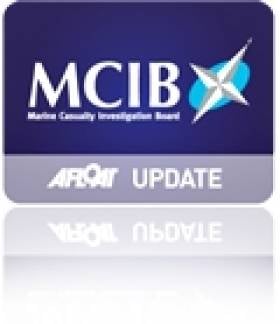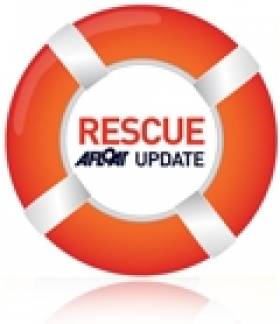Displaying items by tag: Power Boat
MCIB Publish Fatal Powerboat Accident Report on Lough Derg
#powerboat accident – The Marine Casualty Investigation Board (MCIB) has released details of a fatal powerboat accident near Garrykennedy on Lough Derg from 2012.
On the morning of 2nd August 2012, Mr Patrick Danaher purchased fuel for his powerboat at New Line, Killaloe.
That evening, the boat was seen floating partially submerged and overturned with the bow out of the water near Youghal Bay, Lough Derg. Afloat.ie's news report at the time of the capsize is here.
The boat had struck submerged rocks at high speed and suffered major damage to the outdrive allowing the free ingress of water into the boat.
The boat was recovered that evening and Mr Danaher's body was recovered from the lake the following day.
In its conclusions the MCIB said the boat and its machinery were in good condition and did not contribute to the incident.
The displacement of the outdrive port side pivot pin was not significant in the incident.
At the time of the incident the boat was being driven at high speed close to the shoreline.
The post mortem results show that the ethanol levels in Mr Danaher's blood and urine were within the toxic range. However, the influence of alcohol may have affected his ability to:
• effectively apply his local knowledge and experience
• make rational decisions in respect of the speed of the boat and its course
• recognise the danger of driving the boat in such close proximity to the small headland and the submerged rocks adjacent to the headland.
Mr Danaher did bring the control lever to the neutral position and shut down the engine at the time of the incident.
The full report is downloadable here as a PDF file.
More On Power Boat Fireball Off West Cork
#BOAT FIRE - The Irish Independent has more on the incident in which a motor cruiser caught fire off West Cork at the weekend, as previously reported on Afloat.ie.
Denis Ryan, a car dealer from Inishannon in Co Cork, says he is lucky to be alive after a sudden fire engulfed his power boat off the Seven Heads Peninsula on Saturday afternoon.
Ryan was piloting his boat alone in the waters near Courtmacsherry when the incident occurred, destroying the plastic-hulled vessel in a matter of minutes.
His immediate distress signal was picked up by the Naval Service vessel LE Niamh which was in the area at the time, and Ryan himself was quickly rescued from the water by a passing yachtsman.

























































